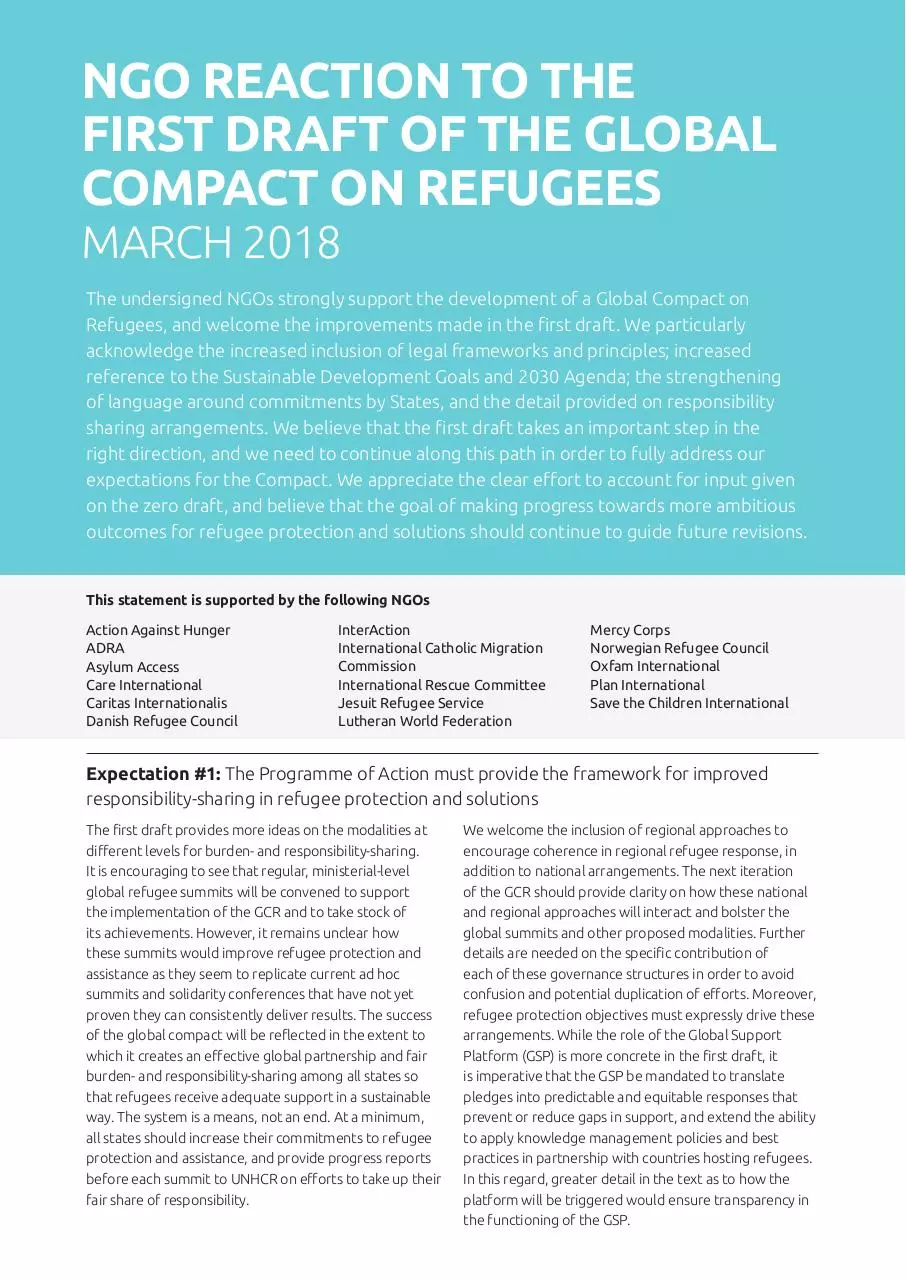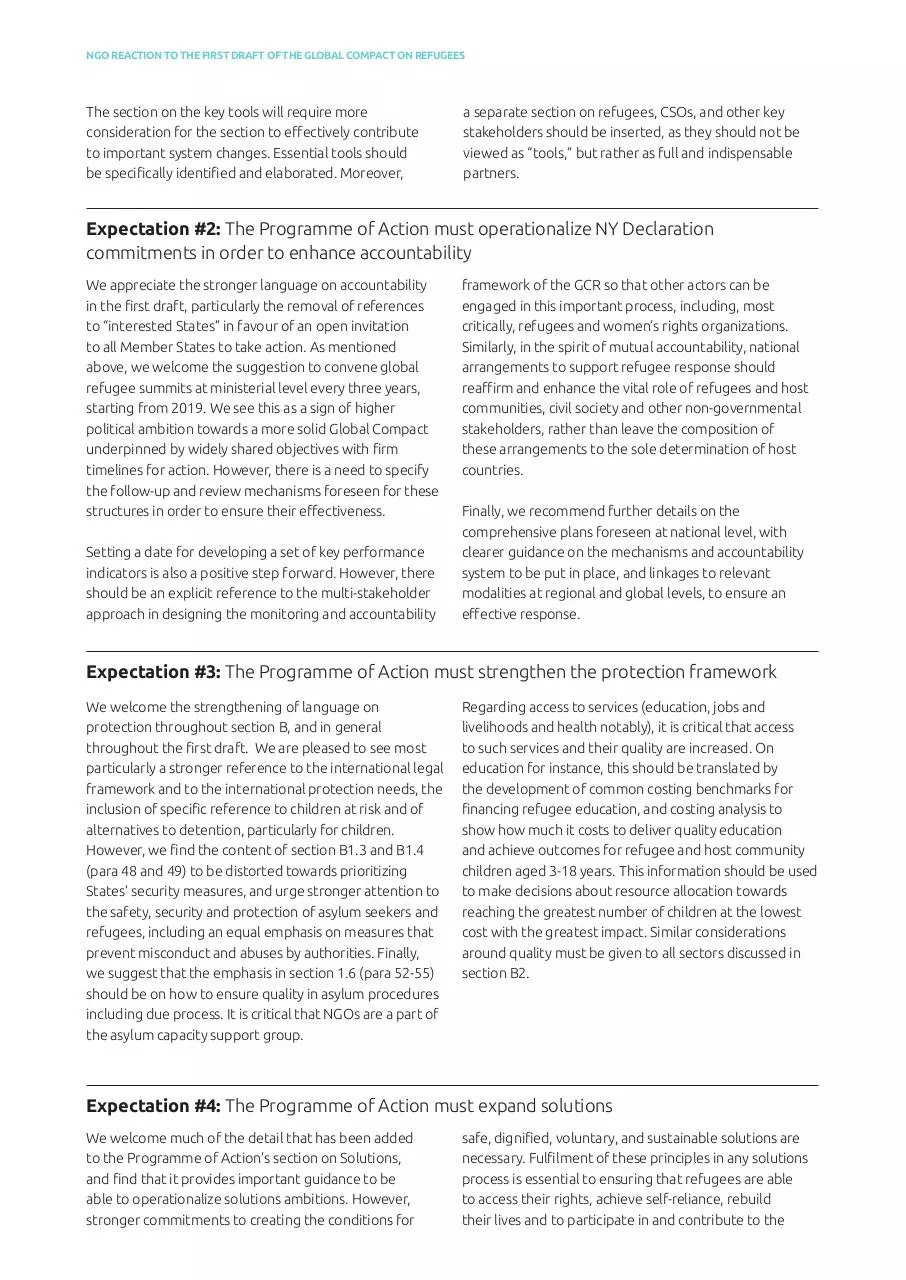ngo reaction to the first draft of the gcr march2018 (PDF)
File information
This PDF 1.4 document has been generated by Adobe InDesign CC 13.0 (Macintosh) / Adobe PDF Library 15.0, and has been sent on pdf-archive.com on 20/03/2018 at 12:22, from IP address 195.94.x.x.
The current document download page has been viewed 231 times.
File size: 420.53 KB (3 pages).
Privacy: public file



File preview
NGO REACTION TO THE
FIRST DRAFT OF THE GLOBAL
COMPACT ON REFUGEES
MARCH 2018
The undersigned NGOs strongly support the development of a Global Compact on
Refugees, and welcome the improvements made in the first draft. We particularly
acknowledge the increased inclusion of legal frameworks and principles; increased
reference to the Sustainable Development Goals and 2030 Agenda; the strengthening
of language around commitments by States, and the detail provided on responsibility
sharing arrangements. We believe that the first draft takes an important step in the
right direction, and we need to continue along this path in order to fully address our
expectations for the Compact. We appreciate the clear effort to account for input given
on the zero draft, and believe that the goal of making progress towards more ambitious
outcomes for refugee protection and solutions should continue to guide future revisions.
This statement is supported by the following NGOs
Action Against Hunger
ADRA
Asylum Access
Care International
Caritas Internationalis
Danish Refugee Council
InterAction
International Catholic Migration
Commission
International Rescue Committee
Jesuit Refugee Service
Lutheran World Federation
Mercy Corps
Norwegian Refugee Council
Oxfam International
Plan International
Save the Children International
Expectation #1: The Programme of Action must provide the framework for improved
responsibility-sharing in refugee protection and solutions
The first draft provides more ideas on the modalities at
different levels for burden- and responsibility-sharing.
It is encouraging to see that regular, ministerial-level
global refugee summits will be convened to support
the implementation of the GCR and to take stock of
its achievements. However, it remains unclear how
these summits would improve refugee protection and
assistance as they seem to replicate current ad hoc
summits and solidarity conferences that have not yet
proven they can consistently deliver results. The success
of the global compact will be reflected in the extent to
which it creates an effective global partnership and fair
burden- and responsibility-sharing among all states so
that refugees receive adequate support in a sustainable
way. The system is a means, not an end. At a minimum,
all states should increase their commitments to refugee
protection and assistance, and provide progress reports
before each summit to UNHCR on efforts to take up their
fair share of responsibility.
We welcome the inclusion of regional approaches to
encourage coherence in regional refugee response, in
addition to national arrangements. The next iteration
of the GCR should provide clarity on how these national
and regional approaches will interact and bolster the
global summits and other proposed modalities. Further
details are needed on the specific contribution of
each of these governance structures in order to avoid
confusion and potential duplication of efforts. Moreover,
refugee protection objectives must expressly drive these
arrangements. While the role of the Global Support
Platform (GSP) is more concrete in the first draft, it
is imperative that the GSP be mandated to translate
pledges into predictable and equitable responses that
prevent or reduce gaps in support, and extend the ability
to apply knowledge management policies and best
practices in partnership with countries hosting refugees.
In this regard, greater detail in the text as to how the
platform will be triggered would ensure transparency in
the functioning of the GSP.
NGO REACTION TO THE FIRST DRAFT OF THE GLOBAL COMPACT ON REFUGEES
The section on the key tools will require more
consideration for the section to effectively contribute
to important system changes. Essential tools should
be specifically identified and elaborated. Moreover,
a separate section on refugees, CSOs, and other key
stakeholders should be inserted, as they should not be
viewed as “tools,” but rather as full and indispensable
partners.
Expectation #2: The Programme of Action must operationalize NY Declaration
commitments in order to enhance accountability
We appreciate the stronger language on accountability
in the first draft, particularly the removal of references
to “interested States” in favour of an open invitation
to all Member States to take action. As mentioned
above, we welcome the suggestion to convene global
refugee summits at ministerial level every three years,
starting from 2019. We see this as a sign of higher
political ambition towards a more solid Global Compact
underpinned by widely shared objectives with firm
timelines for action. However, there is a need to specify
the follow-up and review mechanisms foreseen for these
structures in order to ensure their effectiveness.
Setting a date for developing a set of key performance
indicators is also a positive step forward. However, there
should be an explicit reference to the multi-stakeholder
approach in designing the monitoring and accountability
framework of the GCR so that other actors can be
engaged in this important process, including, most
critically, refugees and women’s rights organizations.
Similarly, in the spirit of mutual accountability, national
arrangements to support refugee response should
reaffirm and enhance the vital role of refugees and host
communities, civil society and other non-governmental
stakeholders, rather than leave the composition of
these arrangements to the sole determination of host
countries.
Finally, we recommend further details on the
comprehensive plans foreseen at national level, with
clearer guidance on the mechanisms and accountability
system to be put in place, and linkages to relevant
modalities at regional and global levels, to ensure an
effective response.
Expectation #3: The Programme of Action must strengthen the protection framework
We welcome the strengthening of language on
protection throughout section B, and in general
throughout the first draft. We are pleased to see most
particularly a stronger reference to the international legal
framework and to the international protection needs, the
inclusion of specific reference to children at risk and of
alternatives to detention, particularly for children.
However, we find the content of section B1.3 and B1.4
(para 48 and 49) to be distorted towards prioritizing
States’ security measures, and urge stronger attention to
the safety, security and protection of asylum seekers and
refugees, including an equal emphasis on measures that
prevent misconduct and abuses by authorities. Finally,
we suggest that the emphasis in section 1.6 (para 52-55)
should be on how to ensure quality in asylum procedures
including due process. It is critical that NGOs are a part of
the asylum capacity support group.
Regarding access to services (education, jobs and
livelihoods and health notably), it is critical that access
to such services and their quality are increased. On
education for instance, this should be translated by
the development of common costing benchmarks for
financing refugee education, and costing analysis to
show how much it costs to deliver quality education
and achieve outcomes for refugee and host community
children aged 3-18 years. This information should be used
to make decisions about resource allocation towards
reaching the greatest number of children at the lowest
cost with the greatest impact. Similar considerations
around quality must be given to all sectors discussed in
section B2.
Expectation #4: The Programme of Action must expand solutions
We welcome much of the detail that has been added
to the Programme of Action’s section on Solutions,
and find that it provides important guidance to be
able to operationalize solutions ambitions. However,
stronger commitments to creating the conditions for
safe, dignified, voluntary, and sustainable solutions are
necessary. Fulfilment of these principles in any solutions
process is essential to ensuring that refugees are able
to access their rights, achieve self-reliance, rebuild
their lives and to participate in and contribute to the
NGO REACTION TO THE FIRST DRAFT OF THE GLOBAL COMPACT ON REFUGEES
societies in which they live (whether in host communities
or their community of origin). Greater reference to
non-refoulement in the overall text of the first draft as
well as the implicit reference to upholding the right to
voluntary repatriation is an important improvement.
However, we are concerned that the statement,
“voluntary repatriation is not necessarily conditioned on
the accomplishment of political solutions in the country
of origin” could open the door for significant violation of
the principle of non-refoulement. Explicit actions must
be elaborated to prevent refoulement in circumstances
where voluntary repatriation is happening in the absence
of political solutions, if this statement remains in the text
of the Programme of Action.
The solutions section of the Program of Action should
place greater emphasis on centrality of national
governance frameworks – i.e. laws, policies and
practices – and the need for effective monitoring of the
application of such frameworks in achieving durable
solutions. The ability of refugees to safely enter States,
obtain legal status, move freely, gain employment
and access state and private services on an equitable
basis with others is exclusively granted to refugees by
individual governments. This ability must be articulated in
a way that promotes access to safe, dignified, voluntary,
informed, and sustainable solutions, regardless of where
a refugee physically resides. Finally, greater attention
should be paid to the needs of refugee children and
others who find themselves in vulnerable situations,
particularly women and girls, and the requisite practices
that must be established in order to ensure adequate
safeguards are in place for the protection of these
individuals in any solutions effort.
Expectation #5: The Programme of Action must facilitate the inclusion and agency of
people of concern
We acknowledge that the first draft maintains a general
commitment to facilitate the participation and agency
of refugees and host communities, and welcome the
increased focus on strengthening women’s and girl’s
participation and leadership in refugee response towards
protection, solutions and peace-building. Participation
is indeed important to deliver effective responses
that reflect needs. Yet it is more than that. As well as
being at the table, women should be empowered to
take up leadership roles, be heard, and fully occupy the
decision-making space created without subjection to
harassment or violence. Individual agency and collective
action derives from a right to self-determination and is
intrinsically linked to human dignity. If the Programme
of Action is to facilitate a ‘participation revolution’ in
refugee response, then there should be a follow-up for a
more much more detailed plan of action at regional and
national levels. A robust consultation and accountability
architecture in refugee response should be strengthened
in three ways: first, by evaluating the context and
need; second, by articulating how refugees and host
communities will contribute to national arrangements
and the development of ‘comprehensive plans’; third,
by making the role of refugees and host communities
explicit in all ‘Areas in need of support’ (part B).
Conclusion
We stand ready to support UNHCR and Member States to
achieve the core expectations described above, respond
to large movements of refugees, and ensure their
effective inclusion in global sustainable development.
The first draft is a positive first step. We hope to build on
this progress as UNHCR continues to revise the text, and
to ensure that the Global Compact becomes a robust tool
for achieving refugee protection and solutions.
Download ngo-reaction-to-the-first-draft-of-the-gcr march2018
ngo-reaction-to-the-first-draft-of-the-gcr_march2018.pdf (PDF, 420.53 KB)
Download PDF
Share this file on social networks
Link to this page
Permanent link
Use the permanent link to the download page to share your document on Facebook, Twitter, LinkedIn, or directly with a contact by e-Mail, Messenger, Whatsapp, Line..
Short link
Use the short link to share your document on Twitter or by text message (SMS)
HTML Code
Copy the following HTML code to share your document on a Website or Blog
QR Code to this page

This file has been shared publicly by a user of PDF Archive.
Document ID: 0000747096.